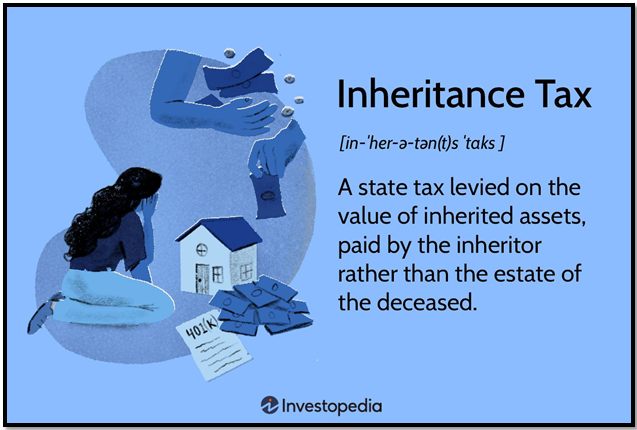A TAX ON ASPIRATION – INHERITANCE TAX
SYLLABUS:
- GS 2: Government policies and interventions for development in various sectors and issues arising out of their design and implementation.
Focus:
- Talks of reintroduction of inheritance tax as a part of political conversation in the present Lok Sabha election cycle is catching up.
Understanding Inheritance Tax
- Nature of Tax: Inheritance tax is imposed on individuals who receive assets from a deceased person’s estate.
- Tax Rates: The rate varies depending on the value of the inherited property and the relationship between the heir and the decedent.
- Forms of Taxation: This tax is also referred to as a death tax, encompassing various types of duties levied upon the death of an individual.
Historical Context in India
- Introduction: India introduced a form of inheritance tax known as estate duty in 1953, targeting the market value of immovable and movable properties.
- Complexities and Costs: The tax was marred by numerous litigations and high administrative costs.
- Abolition: The estate duty was abolished in 1985 during the tenure of Prime Minister Rajiv Gandhi due to its inefficiencies and economic burden.
Global Perspective on Inheritance Tax
U.S. Implementation and Global Discussions:
- S. States with Inheritance Tax: Currently, six states in the U.S. impose inheritance taxes: Iowa, Kentucky, Maryland, Nebraska, New Jersey, and Pennsylvania.
- Global Tax Reform Calls: There is a growing global discourse on taxing the ultra-rich to address economic disparities, including proposals for minimum corporate and wealth taxes in several countries.
- International Adoption: Countries like France, Germany, and the UK, as well as some Southeast Asian nations, implement inheritance taxes to various extents.
Growing Demand for Inheritance Tax in India
- Wealth Inequality: Post-liberalization, India has seen rising wealth and income disparities, with significant wealth concentrated among the top 1% of the population.
- Inclusive Growth Concerns: The increasing Gini wealth coefficient indicates that economic growth has not been equitably distributed.
- Funding Social Sectors: Inheritance tax revenues could support underfunded sectors such as healthcare and education, similar to endowments in Western universities.
- Need for Direct Taxes: Post-COVID-19 economic strains have highlighted the need for additional direct tax sources to manage fiscal deficits.
- Global Practices: Comparatively, many developed and emerging economies utilize inheritance taxes to manage wealth distribution and fund public services.
Benefits and Challenges of Inheritance Tax
Advantages:
- Reduction of Inequalities: It aims to reduce intra-generational inequality and promote inter-generational equity.
- Government Revenue: It could provide a stable and significant revenue source for public welfare initiatives.
- Meritocratic Society: By redistributing wealth, it can help diminish the undue advantages that accrue to individuals by birth.
- Progressive Nature: The tax places a higher burden on wealthier individuals, aligning with principles of progressive taxation.
Challenges:
- Valuation Difficulties: Accurate property valuation for tax purposes can be costly and complex.
- Business Impact: Smaller and less profitable businesses might struggle under the financial pressures of inheritance tax.
- Capital Flight: There is a risk of financial and human capital moving to jurisdictions with more favorable tax conditions.
- Economic Side Effects: The tax might discourage saving, leading to higher inflation and dampened capital asset creation.
- Double Taxation: Inheritance tax is often criticized as it effectively taxes assets that have already been subjected to income or other taxes previously.
Impacts on Middle Class and Youth
- Economic Barriers: Implementing inheritance tax can impede economic growth and diminish the aspirations of the middle class and the youth by creating disincentives for wealth accumulation.
- Asset Liquidation: Beneficiaries might be forced to sell inherited assets, like family businesses or real estate, to cover tax liabilities, disrupting long-established family enterprises.
- Tax Burden Perception: The visibility and perceived burden of inheritance taxes can provoke significant resistance, overshadowing broader fiscal responsibilities and creating distorted tax perceptions.
- Administrative Challenges: The complexity of inheritance tax laws can place a considerable burden on individuals, particularly affecting non-resident Indians and those undergoing emotional distress due to bereavement.
- Wealth Inequality: Although aimed at redistributing wealth, inheritance taxes often fail to level the playing field due to wealthier individuals utilizing loopholes to minimize tax liabilities, leaving the middle class more exposed.
Broader Economic Implications
- Capital Flight: The potential introduction of an inheritance tax could incentivize capital flight, driving investments and talented individuals to more tax-friendly countries.
- Lack of Social Security: In countries like India, where robust social security systems are lacking, reliance on family wealth for security is significant, making inheritance tax particularly burdensome during economic hardships.
- Impact on Long-term Goals: Recent policy discussions around inheritance taxes are seen as regressive by some, potentially hindering India’s goal of becoming the third-largest economy and reaching developed country status by 2047.
- Alternative Wealth Redistribution Methods: Achieving wealth and income equality might be more effectively pursued by engaging broader segments of society in wealth creation, rather than imposing taxes that could stifle economic aspirations.
Way Forward
- Higher Thresholds: Introducing the tax with a high threshold could mitigate some negative impacts on middle and lower wealth classes.
- Tax Exemptions: Provisions should allow tax exemptions for donations made to critical social sectors like healthcare and education.
- Enhanced Tax Administration: Leveraging technology can reduce the costs and improve the efficiency of tax collection.
- Complementary Tax Adjustments: Adjustments in related taxes, like wealth and gift taxes, are necessary to prevent tax avoidance strategies.
Source: The Hindu
Mains Practice Question:
“Discuss the implications of reintroducing inheritance tax in India. Examine its potential impact on wealth distribution and the challenges it may pose in the context of Indian economic conditions. Propose measures that could be implemented to address these challenges effectively.”




